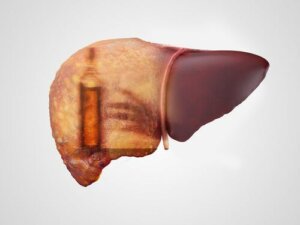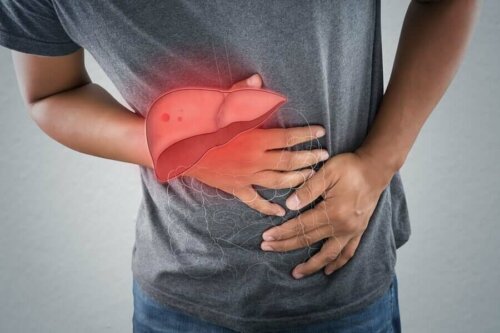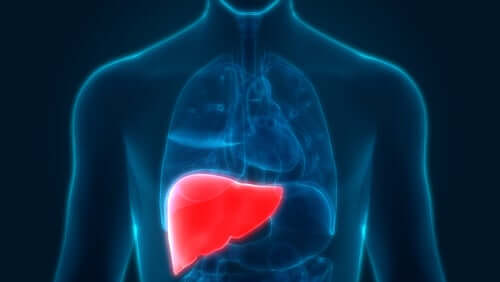Alcoholic Hepatitis: Symptoms, Causes, and Treatments


Written and verified by the doctor Leonardo Biolatto
Alcohol is a legal drug in most countries and also the most consumed drug worldwide. Often, we tend to underestimate the negative impact it has on the body, or we might not even realize. For example, few people know about alcoholic hepatitis.
Alcoholic hepatitis is a condition characterized by inflammation of the liver as a result of drinking alcohol. It’s an injury that’s asymptomatic but, in the long run, can cause irreversible damage to the liver and is even associated with liver cancer.
The fact that it’s asymptomatic makes it almost impossible to calculate the prevalence of this disease. However, we do know that almost 35% of people with alcohol dependence suffer from it. In this article, we’ll explain everything you need to know about alcoholic hepatitis.
What is alcoholic hepatitis?
Alcoholic hepatitis, as we mentioned, consists of inflammation of the liver. It’s generally caused by a prolonged and daily consumption of alcohol. This inflammation causes damage to the liver that can become irreversible if you don’t stop your alcohol habit.
Scientists estimate that for this condition to appear, you have to drink a daily amount of alcohol that varies by sex. That is, men who drink between 30 and 60 grams of alcohol a day (3 to 6 standard drinks) for 10 years will surely develop this pathology.
In the case of women, ingesting between 20 and 40 grams a day (2 to 4 standard drinks) is enough. This difference is due to the fact that women have a lower tolerance to alcohol than men, since they have a lower capacity to metabolize it in their body.
However, you should keep in mind that the risk is relative. If you drink more grams of alcohol, even in a shorter period of time, the risk increases significantly. The truth is that between 15 and 40% of people with alcoholic hepatitis progress to advanced liver disease.

What are the symptoms?
Alcoholic hepatitis may or may not be symptomatic, depending on how much it affects the liver. Many people are asymptomatic and doctors can only detect this injury through blood tests.
However, when the disease is symptomatic, jaundice often occurs. This consists of yellowing of the skin because bilirubin accumulates in the blood. Other common symptoms are nausea and vomiting or loss of appetite.
This means that people with this disorder are often malnourished. Also, alcohol itself causes appetite to decrease, so both factors enhance each other. Another common sign is a feeling of weakness and tiredness.
The problem is that, as alcoholic hepatitis progresses, it can cause liver failure. It’s also associated with liver steatosis, cirrhosis, and even an increased risk of developing liver cancer.
You might like: 6 Diets that Help Care for Your Liver Health
How do doctors diagnose and treat alcoholic hepatitis?
To diagnose alcoholic hepatitis, the doctor needs to know exactly how much alcohol that person consumes daily. In addition, they usually do different tests, such as blood tests, liver ultrasound, or other imaging tests.
Treatment consists mainly of stopping drinking. If this isn’t enough, in some cases a doctor might recommend corticosteroids to reduce inflammation or a liver transplant may even be necessary.

You might be interested in: Liver Metabolism: Antibiotics and Alcohol
Alcohol is a very harmful drug
What you should keep in mind is that alcohol is a very harmful drug for your body. Furthermore, since it’s socially acceptable to use alcohol, we tend to downplay its effect. However, we should try to prevent conditions such as alcoholic hepatitis.
To do this, if you drink alcohol, try to do so in moderation. Also, if you have hepatitis C, remember that drinking alcohol increases the risk of more serious liver disease. Finally, it’s important to know that there are many therapies and ways to overcome alcohol addiction or dependence.
All cited sources were thoroughly reviewed by our team to ensure their quality, reliability, currency, and validity. The bibliography of this article was considered reliable and of academic or scientific accuracy.
- Factores de riesgo para el cáncer de hígado. (n.d.). Retrieved April 23, 2020, from https://www.cancer.org/es/cancer/cancer-de-higado/causas-riesgos-prevencion/factores-de-riesgo.html
- Hepatopatía alcohólica (o etílica): qué es, síntomas y tratamiento. Clínica Universidad de Navarra. (n.d.). Retrieved April 23, 2020, from https://www.cun.es/enfermedades-tratamientos/enfermedades/hepatopatia-alcoholica
- Hepatitis aguda alcohólica. (n.d.). Retrieved April 23, 2020, from http://scielo.isciii.es/scielo.php?script=sci_arttext&pid=S1130-01082011001100010
- Hepatitis alcohólica | ASSCAT. (n.d.). Retrieved April 23, 2020, from https://asscat-hepatitis.org/hepatitis-no-viricas/hepatitis-alcoholica/
This text is provided for informational purposes only and does not replace consultation with a professional. If in doubt, consult your specialist.








